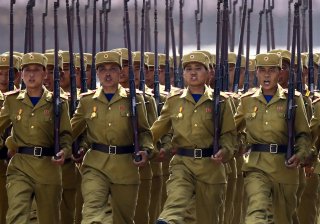North Korea and Syria: A Dangerous Alliance the World Should Fear?
There are signs that ties are strengthening between North Korea and Syria, two of the most isolated countries in the world.
There are signs that ties are strengthening between North Korea and Syria, two of the most isolated countries in the world.
According to a new report by 38 North, Syria “wishes to preserve its historic relationship with North Korea,” while the North Koreans have both been supplying Bashar al-Assad’s regime with weapons technology that was used in the Syrian civil war, and defending it from criticism. North Korea was said to have sent arms to Syria as the Assad regime fought rebels, and even reportedly sent combat units to Syria.
There’s even a park in Damascus named for Kim Il Sung, North Korea’s first leader and the grandfather of current leader Kim Jong-un.
According to the analysis, North Korea and Syria’s historic ties have specially strengthened since Assad succeeded his father, Hafez al-Assad, after his death in 2000. The two countries have helped each other with their nuclear ambitions, with North Korea’s nuclear reactor at Yongbyon serving as a template for Syria’s Al-Kibar nuclear reactor. And when Israel bombed Al-Kibar in 2007, it reportedly killed several North Korean scientists who were present.
Gen. Ali Reza Askari, the high-ranking Iranian general who defected to the U.S. in 2007, told American officials that the Syrian nuclear program was “financed by Iran and built by the North Koreans,” intel that the U.S. shared with Israel, leading the Israelis to bomb the facility later that year, in what was known as Operation Orchard.
Syria, meanwhile, has refused to go along with sanctions against North Korea. And in 2014, election observers from North Korea certified Assad’s election victory- an irony, considering that neither country is particularly known for holding free and fair elections.
38 North also looked at future collaboration between the two countries, looking at three possibilities: Sanctions on Syria could encourage North Korea to participate further in Syria’s rebuilding efforts. Secondly, Syria could play a part in cooperation between North Korea and Iran, or at least with Iran’s proxies. And thirdly, North Korea could assist Syria in retaliating against airstrikes by Israel.
“In spite of crippling UN sanctions, the Syria-North Korea partnership remains robust,” the report concluded. “Since North Korea sees its relationship with Syria as a core pillar in its web of partnerships with anti-Western states, such as Cuba, Iran and Venezuela, high-level diplomatic exchanges between Pyongyang and Damascus are likely to resume once the COVID-19 pandemic subsides. US officials should keep a close eye on Syria-North Korea relations, as they seek to isolate Assad’s embattled regime and limit the proliferation of ballistic missiles across the Middle East.”
Stephen Silver, a technology writer for The National Interest, is a journalist, essayist and film critic, who is also a contributor to The Philadelphia Inquirer, Philly Voice, Philadelphia Weekly, the Jewish Telegraphic Agency, Living Life Fearless, Backstage magazine, Broad Street Review and Splice Today. The co-founder of the Philadelphia Film Critics Circle, Stephen lives in suburban Philadelphia with his wife and two sons. Follow him on Twitter at @StephenSilver.

